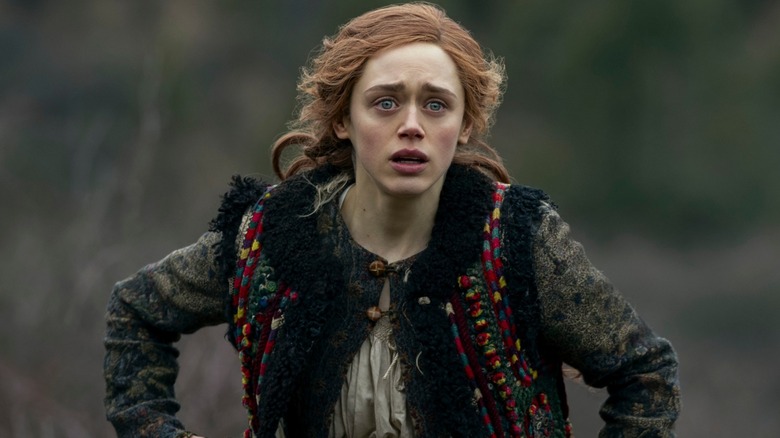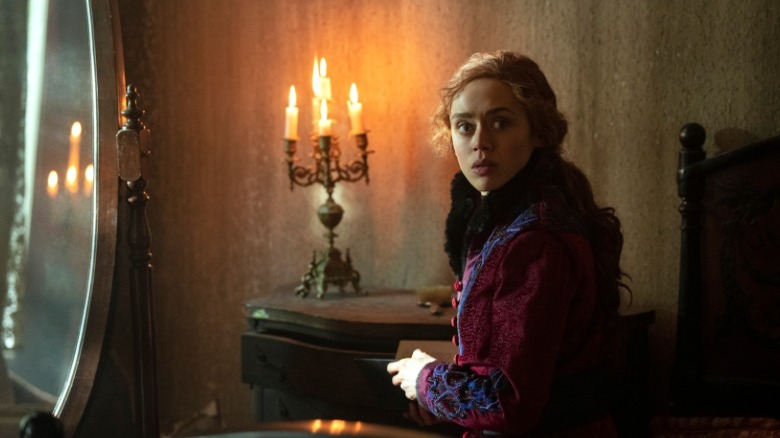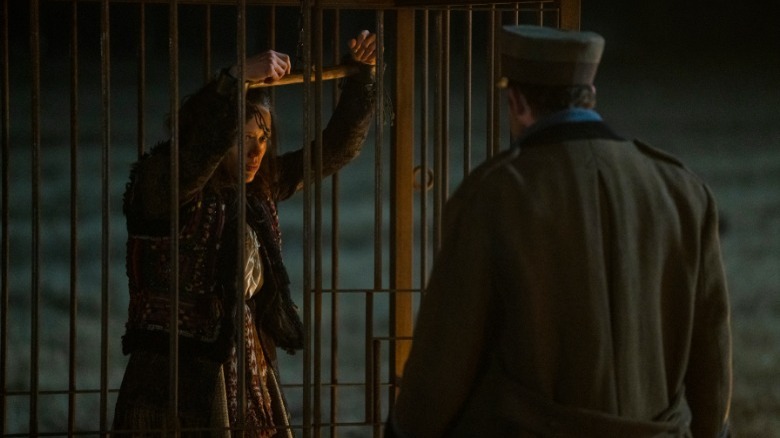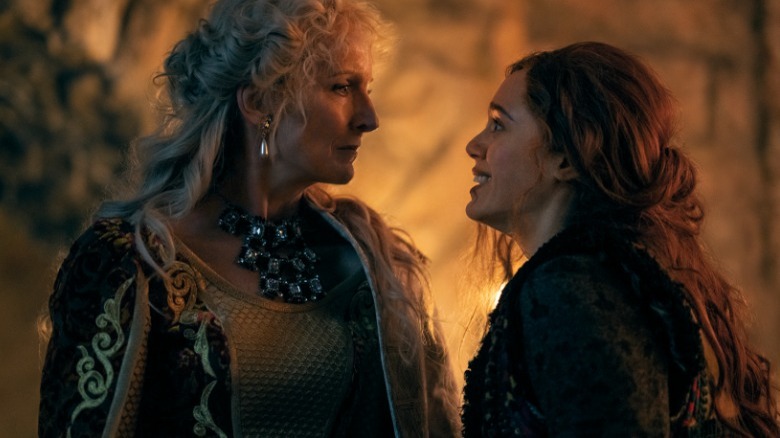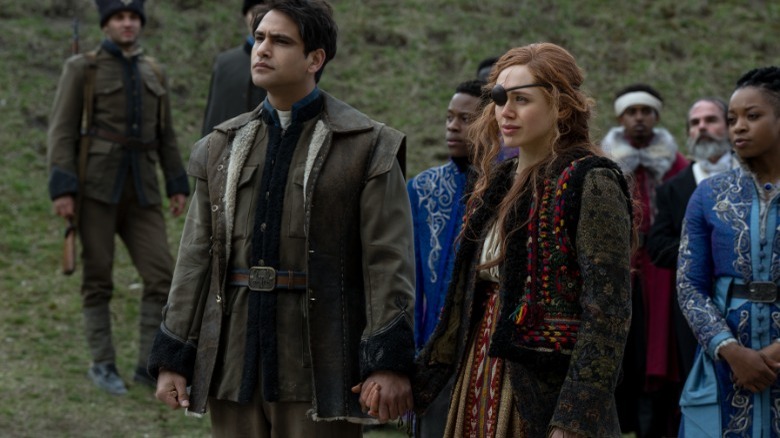Genya Deserved Better In Shadow And Bone Season 2
This post contains spoilers for Netflix's "Shadow and Bone," and Leigh Bardugo's novel series of the same name.
The latest season of "Shadow and Bone" brings greater stakes and grander action to the table, while tautly weaving Alina Starkov's (Jesse Mei Li) path to reuniting Ravka by destroying the Shadow Fold. Although season 2 of "Shadow and Bone" has its merits, it is guilty of making a hamfisted attempt to combine too many storylines from Leigh Bardugo's Grishaverse books, leading to a rushed, fragmentary series of events that barely manage to cohere in the end.
Viewers new to the Grishaverse might not find season 2 shoddily constructed, but those acquainted with Bardugo's novels understand that a lot has been glossed over and retrofitted, robbing standout character moments of their weight due to the lack of proper context. A good example of this would be the omission of Inej's (Amita Suman) traumatic experiences at the Menagerie, which, if provided, would have explained her complicated feelings towards love, and well, Kaz (Freddy Carter) with greater nuance. However, without it, their parting words seem almost too surprising to the point of being out of character, as it is not preceded by a wealth of joint and individual traumas that define them as people.
While a lot of characters got the shorter end of the stick due to flattened, stunted storylines in season 2, there is one seminal character whose arc does not do them justice. I am talking about Genya Safin (Daisy Head), whose heavily condensed storyline reduces her to someone doomed to suffer without respite, leaving no space for her to showcase the depths of who she truly is: a fierce survivor more precious than a ruby.
Setting the stage
Before diving into Genya's journey in season 2, I would like to preface this by saying that her character is still more compelling than that of most this season, thanks to Daisy Head's heartbreaking, measured performance during the most emotion-fraught scenes. Head brings a unique brand of strength and vulnerability to Genya, who, despite having gone through hell since she was five years old, emits a light like no other. However, when push comes to shove, Genya is not afraid to use the same light to blind those who wronged her, which includes the King, who she was tasked to spy on and eventually poison by none other than The Darkling (Ben Barnes).
Season one of the show grants a well-crafted picture of Genya's circumstances, including how she is treated with resentment by most Grisha in Little Palace, while the Queen herself is envious of her beauty. Even though the first season understandably omits certain details from the books, it does a good job of painting Genya as someone without the luxury of freedom, forced to do the bidding of those who act as if they own her. In a way, none of the Grisha are truly free — those trained since birth are discouraged to disconnect from their families in favor of their training, and a deep-seated hierarchy still exists among them, leading to a breeding ground for resentment and gross power play.
Those working directly under the Darkling have even lesser autonomy, including Genya, who endures unimaginable abuse at the hands of the King, and the Darkling does nothing to stop this cruelty. He views her as a pawn, to be battered and molded to his liking, which is an attitude he continues to demonstrate after he "frees" her in season 2.
A fragmented portrait
Although Genya is pushed around like a pawn by those in power, she still exercises an incredible amount of personal power and agency, especially in the books. While we do see glimpses of this in the show, it is an incomplete portrayal at best, as the series does not spend enough time with her to develop this aspect of her character, especially in season 2.
The short amount of time that passes between the Grisha at Little Palace being set free by Kirigan and him attacking Genya with the nichevo'ya barely allows their dynamic to manifest with the depth with which it should. Instead, the tornado of emotions she feels towards the man who sold her to royalty at the age of five is condensed into "You used me to satisfy the King. I should be your greatest shame," which does not even begin to scratch to surface of how Kirigan has wronged her.
"I am not ruined. I am ruination." These were the words Genya had whispered to the King after she is maimed and scarred, which she recounts to Alina in "Ruin and Rising." Although season 2 swaps this out with a powerful confrontation between her and the Queen — where Genya calls her out for turning a blind eye to the King's abuse and treating her like an object — it only serves to heighten the pathos of her journey. Even after Genya manages to flee one prison in the show, she is promptly pushed into another after she is clawed by Kirigan's shadow monsters, which is something she can never fix with her Tailor abilities. This is a cruel irony, as her abilities lie in altering appearances to heal or accentuate beauty, and she can do neither to soothe the trauma that weighs on her.
Razrusha'ya
Alina is the first person in the Little Palace that Genya truly opens up to. Although she is sent to her by Kirigan to help her adjust to the Grisha way of life, the two form a genuine, authentic bond rooted in mutual trust. During this time, even Alina finds solace in Genya alone, especially after she starts to peel back the layers of truth about Baghra and Kirigan. In the books, the events that follow are a tad different: Alina's feelings when she realizes that Genya is forced to do The Darkling's bidding are extremely complicated.
On the one hand, Alina cannot fathom Genya's betrayal, but on the other, she understands how it feels to be manipulated and used as a pawn by Kirigan, who is not someone to be trifled with. Here, forgiveness is gradual, whereas the show reunites them abruptly and gets to Alina forgiving her immediately. Although this works in the context of the scene (where Nikolai wants her punished for poisoning the King), it skips over many stages of grief and acceptance to reach that point.
Moreover, the show does not elude to her status as Razrusha'ya, meaning "The Ruined," which is what prompts the memorable lines she whispers to the King. After she is scarred by nichevo'ya, this prompts Grisha to think that she might be cursed in the books, adding more layers to the alienation she feels even after escaping Kirigan's hold. This omission is perhaps for the best, as the show already charts a rather heartbreaking path for her, with glimpses of her quiet strength and power struggling to shine through the cracks. While she and David (Luke Pasqualino) share some sweet moments where he sincerely affirms her value and beauty as a human being, this bliss is painfully short-lived.
The David problem
Yes, David's fate remains unclear, as we do not see a body. However, it is presumed that he is dead, as there is no trace of him after Alina kills Kirigan. That being said, David and Genya's relationship has been heavily truncated when compared to the books, and I would argue that the two do not spend nearly enough time together to warrant the ruby scene prior to the final climax. It is too much too soon, as the nuances of their relationship, which are developed in depth in Bardugo's "King of Scars" duology, are not even allowed to blossom. Instead, David chooses to sacrifice himself to save Genya, leading her to cradle yet another fresh wound that might never heal.
Although David's omission from the Grisha Triumvirate is a major change, his death adds a definite tint to this alteration, as it drastically reduces the character's scope and value. While David might somehow return, the emotional blow of his death is too cruel for Genya, who learns that he had been intending to propose to her with a ruby-encrusted ring. Moreover, if David's death is final, his role in aiding Nikolai is now completely defunct, which hampers grander events in the Grishaverse. This also robs us of memorable David x Genya team-ups, where the two work together to pull off the izmars'ya performance, a highlight in the books. Although David does die in the book, this happens after the two are already married and are together for quite some time. In the show, their love is a faint promise, where dreams of a future together are dashed abruptly.
In the latest season of "Shadow and Bone" Genya Safin is a woman robbed of everything that might grant her happiness, and she absolutely deserves better.
